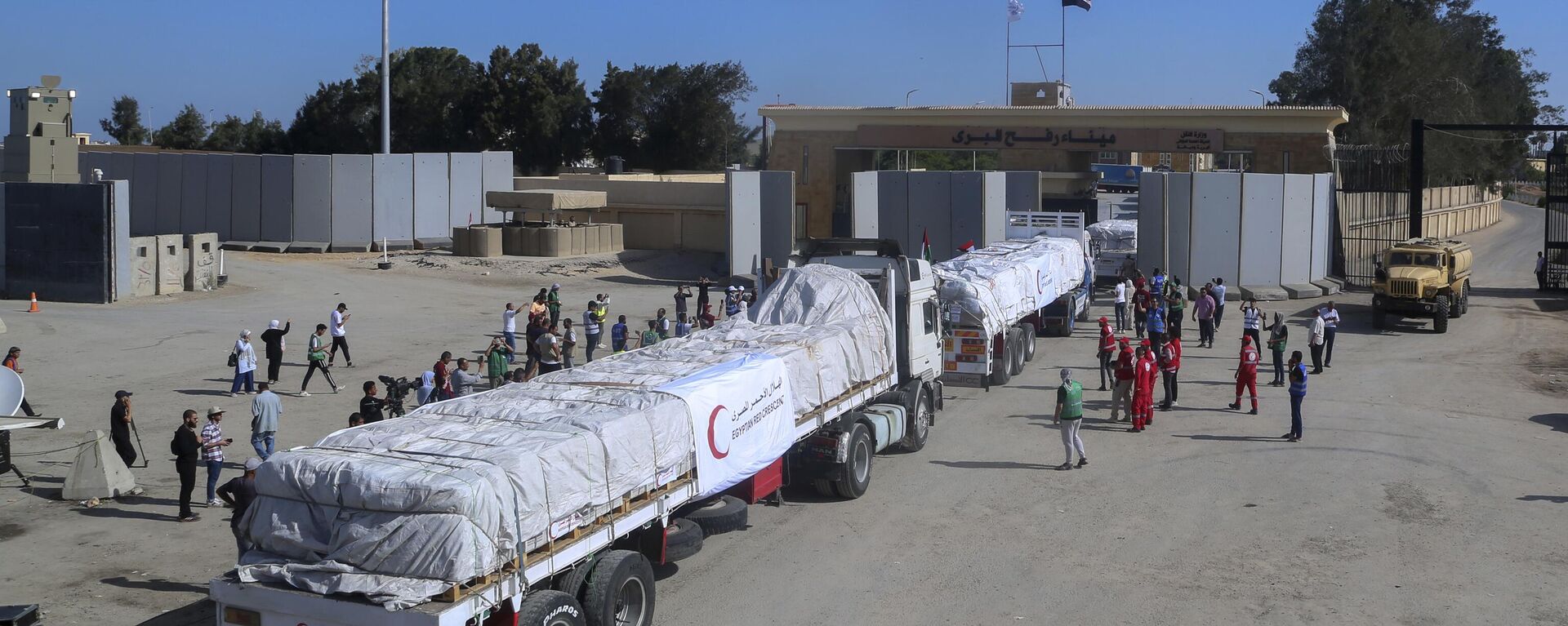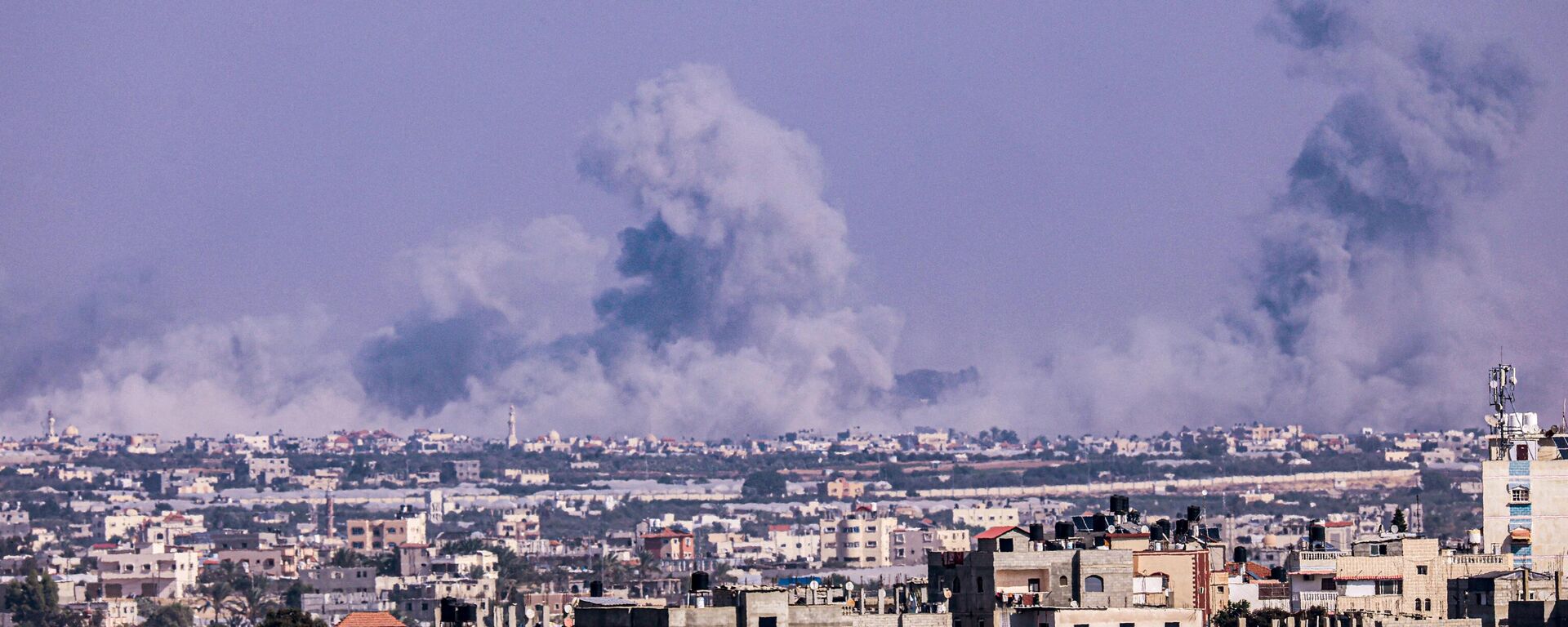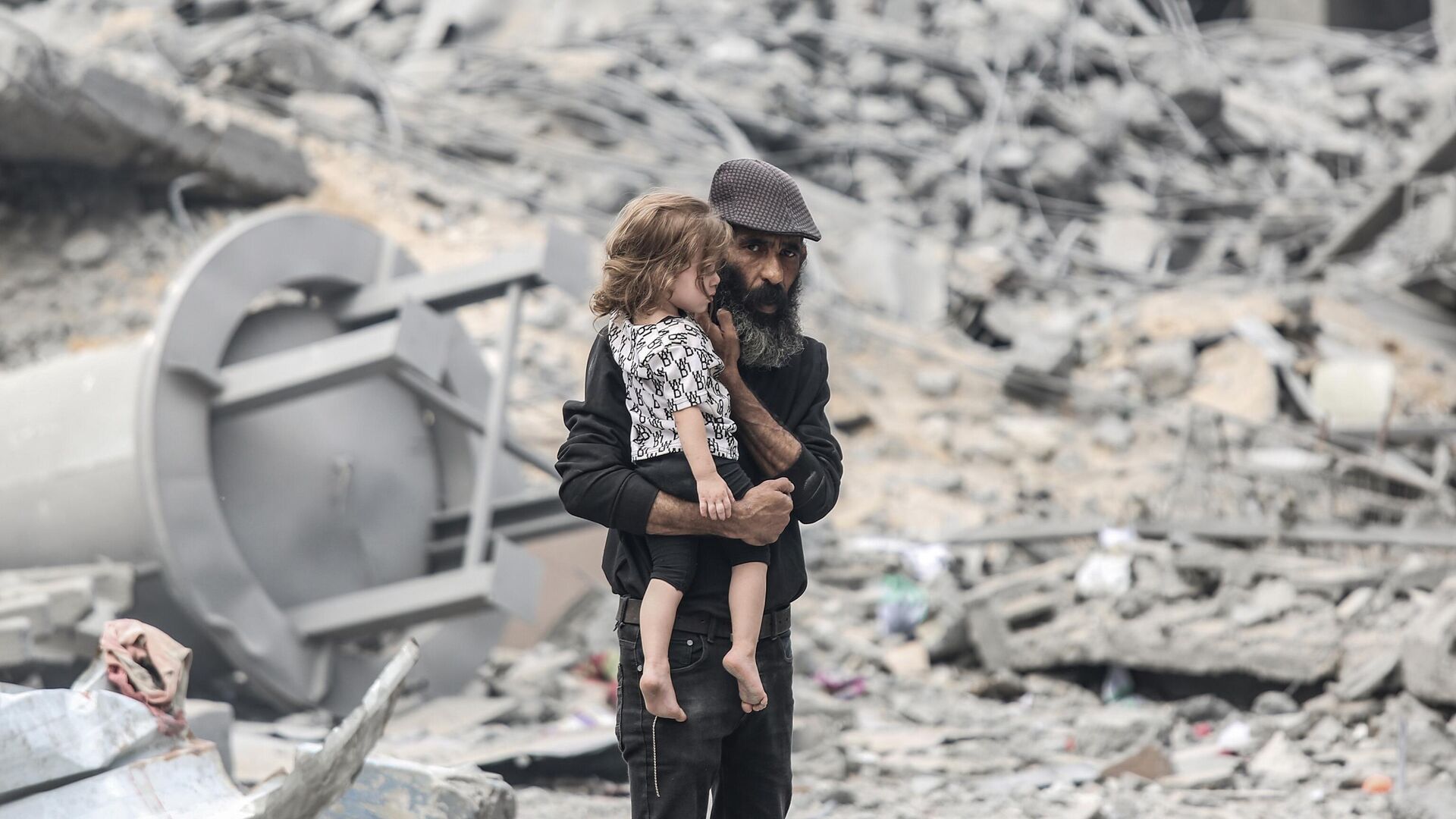https://sputnikglobe.com/20231107/israel-forced-to-consider-gaza-tactical-pause-due-to-intensity-of-global-protests-1114797357.html
Israel Forced to Consider Gaza 'Tactical Pause' Due to 'Intensity' of Global Protests
Israel Forced to Consider Gaza 'Tactical Pause' Due to 'Intensity' of Global Protests
Sputnik International
A military expert told Sputnik that mass pressure around the globe to end the Palestinian suffering in Gaza was making a humanitarian pause in the fighting increasingly necessary.
2023-11-07T17:55+0000
2023-11-07T17:55+0000
2023-12-05T09:23+0000
analysis
michael maloof
israel
hamas
benjamin netanyahu
humanitarian corridors
humanitarian pause
protests
gaza strip
https://cdn1.img.sputnikglobe.com/img/07e7/0b/04/1114710727_0:160:3072:1888_1920x0_80_0_0_3b3b2b1da89d9517046ef0b67010c774.jpg
During a call with Israeli Prime Minister Benjamin Netanyahu on Monday, US President Joe Biden discussed what he called a “tactical pause” in Israel’s month-long assault on the Gaza Strip. Biden has opposed a ceasefire between Israel and Hamas since the Hamas attack on Israeli settlements on October 7, saying Israel has a right to defend itself.Asked about such a pause in an interview with US media later on Monday, Netanyahu didn’t dismiss the idea, but offered “an hour here, an hour there … in order to enable goods, humanitarian goods to come in, or our hostages, individual hostages to leave.”With the White House behind his position, Netanyahu has said the Israel Defense Forces (IDF) will not stop their attack on Gaza until Hamas is destroyed and no longer the governing power in Gaza, where the Palestinian militant group won elections in 2006. More than 10,000 people have been killed in Gaza by the Israeli bombardment and ground invasion.Michael Maloof, former senior security policy analyst in the Office of the US Secretary of Defense, told Sputnik that for an effective tactical pause, “you need it in terms of a few days. What’s one hour?”“There's very serious talk now of a 48-hour pause to allow humanitarian aid to go in. I think that the goal will be to try and get an idea of where the hostages are actually located. They are in relatively safe areas, according to the Israelis, otherwise, they wouldn't be going ahead with their offense the way that they are, because they have to go into these tunnels. So they probably have an idea where the hostages are actually located. But for the majority of the Palestinian people who are not Hamas, critical aid is essential.”Maloof explained that a tactical pause is not a ceasefire, but is “meant to have a 48-hour cessation of hostilities long enough to allow essential goods to get in to the affected population.”Maloof said that a major Israeli concern was just how reliable such a pause might be in terms of security.“You don't know unless you try,” he said.“What does this mean when they say a tactical pause: is that throughout all of Gaza or just portions of it? That's unclear. I think that, where they think that there's a heavy concentration of fighting - you know, to have a pause, you need both sides to agree. Will the [Hamas] commanders on the ground agree to what the leadership might agree to politically in Qatar? Unknown. So we need to see what the reaction will be on both sides. And you may have local commanders that may disagree, who are so involved in this thing that they don't care what the leadership says. So we have to see how it works out, whether it can hold, whether a pause can hold for a certain period of time,” Maloof said.“Something's got to be done. If we can get the normalization process underway that Saudi Arabia and UAE want, they can help tamp down things, agree to a deal. And the fact that Iran and Saudi Arabia have reestablished diplomatic relations I think is an important development. And I think over time, this can help to smooth things out, so that the Israelis can feel that they can still live there. But they've got to do something about the Palestinian issue and that is not to drive them out of their own lands. This is where things really - this is the nub of the problem, how do you reconcile that is something else.”
https://sputnikglobe.com/20231107/live-updates-israeli-airstrike-on-nasser-hospital-in-gaza-kills-8-people---reports-1114776081.html
https://sputnikglobe.com/20231106/leaked-memo-reveals-us-diplomats-concerns-over-biden-administrations-israel-policy-1114772330.html
israel
gaza strip
Sputnik International
feedback@sputniknews.com
+74956456601
MIA „Rossiya Segodnya“
2023
News
en_EN
Sputnik International
feedback@sputniknews.com
+74956456601
MIA „Rossiya Segodnya“
Sputnik International
feedback@sputniknews.com
+74956456601
MIA „Rossiya Segodnya“
humanitarian pause; tactical pause; gaza; ceasefire; palestinians; israel; michael maloof
humanitarian pause; tactical pause; gaza; ceasefire; palestinians; israel; michael maloof
Israel Forced to Consider Gaza 'Tactical Pause' Due to 'Intensity' of Global Protests
17:55 GMT 07.11.2023 (Updated: 09:23 GMT 05.12.2023) A military expert told Sputnik that while there was a great deal of uncertainty regarding talks of a humanitarian pause in the fighting in Gaza, including how well such a pause might be respected, the mass pressure around the globe to end the Palestinian suffering in Gaza was making such a pause increasingly necessary.
During a call with Israeli Prime Minister Benjamin Netanyahu on Monday, US President Joe Biden discussed what he called a “tactical pause” in Israel’s month-long assault on the Gaza Strip. Biden has opposed a ceasefire between Israel and Hamas since the Hamas attack on Israeli settlements on October 7, saying Israel has a right to defend itself.
Asked about such a pause in an interview with US media later on Monday, Netanyahu didn’t dismiss the idea, but offered “an hour here, an hour there … in order to enable goods, humanitarian goods to come in, or our hostages, individual hostages to leave.”
"There'll be no ceasefire, general ceasefire, in Gaza without the release of our hostages," Netanyahu said. Confusingly, Hamas has for more than three weeks offered to release all of the more than 240 Israeli hostages captured on October 7 in exchange for an end to Israeli bombing.
With the White House behind his position, Netanyahu has said the Israel Defense Forces (IDF) will not stop their attack on Gaza until Hamas is destroyed and no longer the governing power in Gaza, where the Palestinian militant group won elections in 2006.
More than 10,000 people have been killed in Gaza by the Israeli bombardment and ground invasion.
Michael Maloof, former senior security policy analyst in the Office of the US Secretary of Defense, told Sputnik that for an effective tactical pause, “you need it in terms of a few days. What’s one hour?”
“There's very serious talk now of a 48-hour pause to allow humanitarian aid to go in. I think that the goal will be to try and get an idea of where the hostages are actually located. They are in relatively safe areas, according to the Israelis, otherwise, they wouldn't be going ahead with their offense the way that they are, because they have to go into these tunnels. So they probably have an idea where the hostages are actually located. But for the majority of the Palestinian people who are not Hamas, critical aid is essential.”

7 November 2023, 04:51 GMT
“So there is talk and there appears to be an interest by Netanyahu to accommodate that,” he said. “It's something that is due to pressure, outside pressure, international pressure. Look at the demonstrations occurring in the United States right now: the pressure is building. I haven't seen anything like that since the demonstrations against the Vietnam War. I mean, it's getting to that level of intensity in the United States. That speaks volumes. It will only increase over time if nothing is done.”
Maloof explained that a tactical pause is not a ceasefire, but is “meant to have a 48-hour cessation of hostilities long enough to allow essential goods to get in to the affected population.”
“There's nowhere [for the civilians] to go. I mean, the Egyptians are allowing very limited numbers” to cross the border, Maloof explained. “People are afraid to even leave Gaza because they're being killed on the way. They're being targeted. I've seen videos of bodies strewn on the corridor roads trying to lead out, whole families wiped out. And it goes unreported, basically, in the mainstream media, but it's happening, and people are deathly afraid, they don't know where to turn. They've no house. But on the other hand, if they take off, there's a high probability of getting killed anyway. So what do you do under those circumstances? It's a real dilemma for people. And I feel very, very badly for them, it's not a position [you want] to be in.”
Maloof said that a major Israeli concern was just how reliable such a pause might be in terms of security.
“You don't know unless you try,” he said.

6 November 2023, 20:20 GMT
“What does this mean when they say a tactical pause: is that throughout all of Gaza or just portions of it? That's unclear. I think that, where they think that there's a heavy concentration of fighting - you know, to have a pause, you need both sides to agree. Will the [Hamas] commanders on the ground agree to what the leadership might agree to politically in Qatar? Unknown. So we need to see what the reaction will be on both sides. And you may have local commanders that may disagree, who are so involved in this thing that they don't care what the leadership says. So we have to see how it works out, whether it can hold, whether a pause can hold for a certain period of time,” Maloof said.
“If that doesn't work, well, then that tells the Israelis, and even Hamas, the direction they need to proceed. This thing is not going to be over anytime soon. This effort could go on for months. And if that happens, it's only going to escalate and bring other forces to bear on this. I would watch what Turkiye has in mind, I would watch what Iran has in mind, and especially the militias in Iraq, that's an unknown as well. They have missiles as well that could create a lot of havoc and especially on existing US forces. The answer is, none of this would be happening if US forces weren't there, as far as I'm personally concerned, because we basically have all these self-fulfilling prophecies that come about just like with Ukraine,” he said.
“Something's got to be done. If we can get the normalization process underway that Saudi Arabia and UAE want, they can help tamp down things, agree to a deal. And the fact that Iran and Saudi Arabia have reestablished diplomatic relations I think is an important development. And I think over time, this can help to smooth things out, so that the Israelis can feel that they can still live there. But they've got to do something about the Palestinian issue and that is not to drive them out of their own lands. This is where things really - this is the nub of the problem, how do you reconcile that is something else.”




